
The automation debate – whether robots will take your job – has led to a dangerous theory: we face mass unemployment, so we need a basic income. A host of billionaires support this theory: Mark Zuckerberg of Facebook, Elon Musk of Tesla, Pierre Omidyar of eBay, and maybe Jeff Bezos of Amazon. There is academic support. Two researchers did a paper titled ‘The future of employment’ in 2013, claiming in the abstract that 47 per cent of American jobs were at risk from automation. A basic income has both admirable supporters and Milton Friedman. But the narrative is deeply misguided, as I explore here and in a forthcoming article, because (1) credible evidence for future technological unemployment does not exist, (2) full employment will exist when we stop asset owners restricting investment, and (3) we need universal fair incomes, not just a basic income that subsidises poverty-paying employers.
The evidence for technological unemployment does not exist
When Frey and Osborne released their 2013 paper on ‘The future of employment’, few people read past the abstract headline: 47 per cent of jobs were (supposedly) ‘at risk’ from automation. Somewhere in the paper’s middle, the real method was explained: that “with a group of [machine learning] researchers, we subjectively hand-labelled 70 occupations, assigning 1 if automatable, and 0 if not’ by ‘eyeballing’ different tasks.” In other words, the method was like getting some mates to guess goals for the World Cup. This method is unfalsifiable: like picking race horses, betting on stocks and shares, or staring into a crystal ball.
Even more, the claim of 47 per cent of jobs being at risk was over ‘some unspecified number of years, perhaps a decade or two’. What does that mean? 5 years, 20 years, 200 years? I didn’t know, so I decided to do my own study. I ‘subjectively hand-labelled’ 25 occupations from Geoffrey Chaucer’s The Canterbury Tales (1387) by ‘eyeballing’ different tasks: 1 for employed, 0 for not, and the innovation of 0.5 for part-employed.
Table 1. Occupations from The Canterbury Tales
I reached the result that merely 46 per cent of jobs have actually been lost in 631 years, or 1 per cent under Frey and Osborne’s study. Now you might say my Canterbury Tales study uses a questionable categorisation of jobs, lazy statistics and an unscientific method. But it has one thing which Frey and Osborne did not: evidence.
Of course I’m joking, and the trouble is not Frey and Osborne, but the tomes of conflicted ‘research’ that followed from Citigroup, Deloitte, McKinsey, or PwC. Like the billionaires, these firms want to suggest automation will create mass unemployment, because they sell consultancy services where people are made redundant. They profit from stoking social anxiety, and a climate of inevitability. Frey and Osborne recently distanced themselves from claims of unemployment ‘apocalypse’. Osborne, himself, has been exceptionally generous in correspondence with me and is genuinely concerned about social solutions to modern problems. But evidence-free claims are now widespread, and must be stopped: the false claim that unemployment (not just redundancies) or even inequality, results from technology, not changes in labour rights and law.
Full employment is possible by ensuring asset owners cannot restrict investment
The cause of unemployment is the artificial restriction of investment when asset owners hoard capital. Full employment means getting all the hours you want ‘at fair wages’ – not under-employment and zero hour contracts. It means an unemployment rate of 1.2 to 2.7 per cent, like the UK had from 1945 to 1971:
Figure 1. UK unemployment 1881-2017 and inflation 1948-2016
Note: Cropped. For the original, please see McGaughey 2018. All rights reserved. Sources: Denman and McDonald, Unemployment statistics from 1881 to the present day (Jan 1996), Labour Market Trends, ONS, Unemployment rate MG5X (1995-2017), ONS, RPI. All items: percentage change over 12 months (2017).
When the UK committed to full employment, inequality also decreased because unions gave people a real voice at work. Even more, at universities, steel or the post, votes at work were spreading. Inflation was low, and equal prosperity was cross-party political consensus: Conservative, Labour and Liberal.
In the US, there was no post-WW2 consensus. Democrats always left the White House with unemployment lower: down 12 per cent overall. Republicans always left the White House worse: up 14 per cent overall. Why do Republicans have an abysmal job-killing record? They are captured by big business, and higher unemployment reduces worker power. Mass incarceration, from Reagan on, would raise the real US unemployment rate even more, by around 1.3 per cent. This is America: not full employment in a free society.
Figure 2. US unemployment with incarceration 1892-2016
Note: Cropped. For the original, please see McGaughey 2018. All rights reserved. Sources: Bureau of Labor Statistics, Labor Force Statistics from the Current Population Survey, Bureau of Justice Statistics, Key Facts at a Glance: Correctional populations
Republican politicians were propped up by evidence-free theories of Friedrich von Hayek and Milton Friedman, who argued unemployment was ‘natural’. Their enemy was the Universal Declaration of Human Rights of 1948, which says: ‘Everyone has the right to work’ for ‘just and favourable remuneration’ and more ‘holidays with pay’. In 1950, Hayek said government could never use fiscal or monetary policy to get full employment because to pay for ‘the kind of services… the unemployed offer’ there would be ‘major inflationary effects’. This claim was evidence-free.
But in 1967 Friedman, now American Economic Association President, argued a ‘natural’ unemployment rate came from the ‘legal minimum wage rates’, pro-labour public procurement and ‘the strength of labor unions’. If government tried to go below ‘they will trigger inflation.’ In 1977 there was still no evidence for ‘natural’ unemployment, but Friedman argued the natural rate had ‘clearly been rising’ because ‘women, teenagers and part-time workers’ were entering the labour force, and welfare was ‘more generous’. Friedman was wrong: if production expands when there is full employment, there will be no inflation. Everyone will be better off. Unemployment and inflation have no relationship.
Figure 3. The random non-correlation of UK and US unemployment and inflation
Note: Cropped. For the original, please see McGaughey 2018. All rights reserved.
We get full employment with full investment. The UK’s Employment Policy did just this after WW2 (like Germany, Australia, Japan, France…) even though 42 per cent of workers were actually redundant immediately upon armistice (not over ‘some unspecified number of years’) from the front and munitions factories. Government promised to balance private sector and international volatility. It required quotas of disabled veterans be hired to big companies. It spread development so regions were not depressed, brewing fascist discontent. But in fact, full employment also cost almost nothing to sustain. There was no mass Keynesian counter-cyclical spending. Once government committed to do ‘whatever it takes’, business confidence was sound. After OPEC shocked our oil-dependent economies, full employment was possible again.
Although full employment costs little, corporations who hoard cash and restrain investment must pay their fair share of tax. In 2016, US non-financial firms hoarded $1.68 trillion in cash. Apple, Microsoft, Alphabet, Cisco and Oracle alone held $504 billion: enough to give every unemployed American a full-time job on $10 an hour for a four-year term. This is why a US job guarantee on fair wages, which would stop workfare, and stop people being forced to work through poverty, has been rapidly gaining popularity.
People want universal fair incomes, not basic incomes subsidising bad employers
People want universal fair incomes, not just a basic income. This said, there are very different models of the basic income. The billionaires may fantasise about it as a subsidy for their poverty-pay, while taking all the gains of economic growth, and ‘converting’ it ‘into space travel’. Most advocates see basic income as a way of completing the promise of universal social security. They oppose the stigma of benefits, and being forced to work at Poundland, because income insurance is a right we pay for, not a charity we should beg for, or a subsidy for poverty-pay employers. In fact, social security helps people who never collect it the most. It raises all workers’ bargaining power, because people are no longer dying for a job. With careful tax reform, social security can become universal again. But this is just a start: modern law has always aimed for a minimum floor of rights, and ways to achieve fairness beyond the minimum.
We achieve a ‘fair day’s wage for a fair day’s work’ – and stop soaring inequality – by restoring full employment, voice and votes at work. That means (1) sectoral collective bargaining, which guarantees everyone fair pay, (2) the right to vote for your boss, and hold executives accountable in corporate governance, and (3) taking back the votes in company shares bought with your retirement savings: pension, insurance or mutual funds, that are monopolised by asset managers and banks.
Figure 4. UK union membership and income inequality 1900-2010
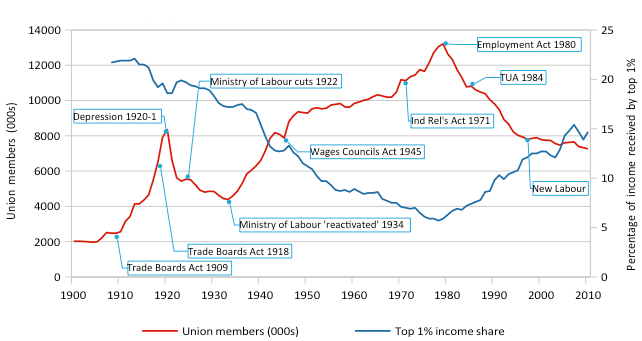
Note: Cropped. For the original, please see McGaughey 2018. All rights reserved. Sources: N Brownlie, Trade Union Membership 2011 (DBIS 2012) 22-23 T Piketty, Capital in the Twenty-First Century (2014) Technical Appendices, Table S9.2
Without voice at work, a basic income will subsidise poverty-paying employers, just like housing benefit without rent regulation goes straight into landlords’ pockets. This is why democracy in the economy must be defended, as much as it is in politics. Once people can see and understand the institutions that shape their lives, and vote in shaping them too, robots will not automate your job away. There will be full employment, fair incomes, and a thriving economy democracy.
♣♣♣
Notes:
- This blog post is based on the authors’ paper Will Robots Automate Your Job Away? Full Employment, Basic Income, and Economic Democracy, CBR, Cambridge, Working Paper no. 496, 2018.
- This post gives the views of its authors, not the position of LSE Business Review or the London School of Economics.
- Featured image credit: Photo by Adi Goldstein on Unsplash. The charts in this blog post are not under Creative Commons. All rights reserved.
- When you leave a comment, you’re agreeing to our Comment Policy.
 Ewan McGaughey is a lecturer in private law at the School of Law, King’s College, London and the Centre for Business Research, University of Cambridge. This blog summarises ‘Will Robots Automate Your Job Away? Full Employment, Basic Income, and Economic Democracy’ (2018) CBR, Cambridge, Working Paper no. 496. Please contact at @ewanmcg or ewan.mcgaughey@kcl.ac.uk.
Ewan McGaughey is a lecturer in private law at the School of Law, King’s College, London and the Centre for Business Research, University of Cambridge. This blog summarises ‘Will Robots Automate Your Job Away? Full Employment, Basic Income, and Economic Democracy’ (2018) CBR, Cambridge, Working Paper no. 496. Please contact at @ewanmcg or ewan.mcgaughey@kcl.ac.uk.


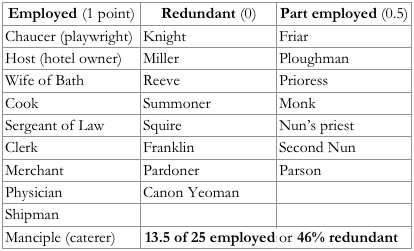
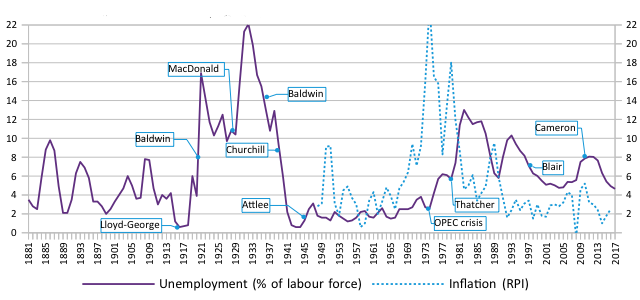
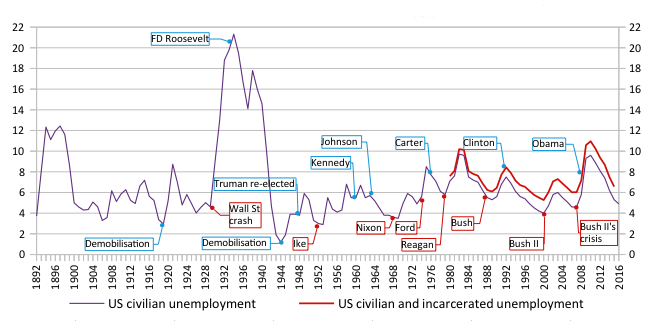
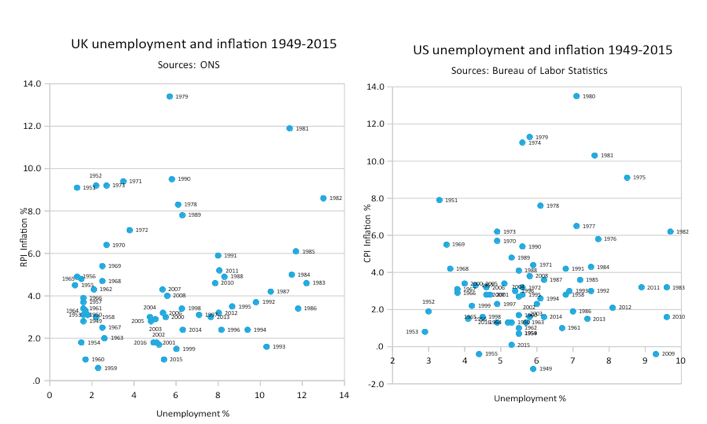




I agree with the analysis of the impact of new technology, that the natural rate should be consigned to the dustbin of history, and that full employment is achievable (though I would quibble over the definition used here). I would welcome worker representatives on boards, the strengthening of voice in the workplace, and stronger independent social partner institutions..
Trade unions and employers will agree what form of bargaining suits them best. But with union membership in the private sector down to 15 per cent, any change in arrangements is unlikely to have much influence on wage setting across the market economy.
The article is far too dismissive of the reaction of labour markets and labour market institutions to underlying inflationary pressures and shocks. Inflation was already a problem in the 1960s in the UK with widespread labour and skill shortages. Attempts to control wage and price responses to the OPEC shock failed.
The article is badly let down by what are little more than empty and often meaningless slogans and assertions such as “a fair days work for fair days pay” or “the right to vote for your boss”.
When plotting unemployment against inflation would it not be better to consider the impact of time. If there were a cause and effect between unemployment and inflation would there not be some delay. So, for example, would it not be better to compare unemployment in one year against inflation 1, 2 and 3 years later to see if there was any correlation there?
Much of the arguments against a UBI here are just heavily embued with “dignity of labour” anarchonism.
What is the point of forcing people to work to survive when we have resources to ensure those who wish to pursue volunteering, raising a family, entrepreneurship or merely want to work part-time can do so? Collectivism?
The last time the “dignity of labour” crowd ignored the growing popular individualism of their day (from the break up of the two party system as seen with the Liberal revival to wild cat strikes and a rising New Left) people took the vision offered by Thatcher.
At points this article seems to dismiss UBI as nothing more than a subsidy to employers. But that ignores the effect on bargaining power and labour supply of an unconditional income. As well as the beneficial effects on family stability, personal development, education, and mental health etc.
Would you continue this argument by saying that the free health insurance provided by the NHS is nothing more than a subsidy enabling poverty wages?